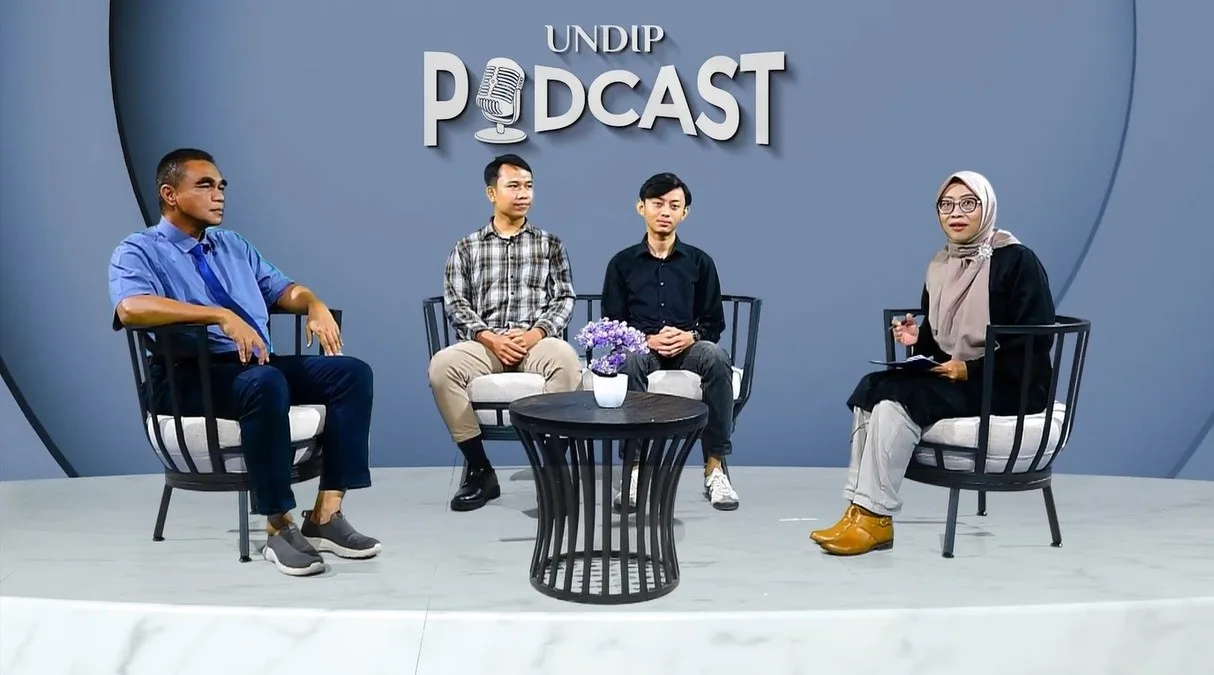UNDIP, Semarang (June 24, 2025) – Universitas Diponegoro continues to strengthen its commitment to sustainability by launching various environmental initiatives. One standout program is the Greendips Scholarship—an action-based environmental scholarship that transforms waste into an opportunity for students to contribute to environmental stewardship while receiving educational support.
The UNDIP TV podcast titled “Discussing Trash at UNDIP: From Green Habits to Greendips Scholarship” featured three speakers from diverse backgrounds united by a shared vision: to build a green and sustainable campus. The speakers were Dr. Bina Kurniawan, SKM, M.Kes. (Head of UNDIP’s Environment, Health, and Safety Unit – UPT K3L), Adam Nur Wahid (Head of Environmental Affairs at the UNDIP Student Executive Board), and Muhammad Dzikri Prayoga (Greendips Scholarship awardee and Chairman of the Society of Renewable Academic).
Dr. Bina revealed that UNDIP produces around one ton of waste daily. “We need various innovations so that UNDIP no longer sends waste to landfills but manages it independently—especially non-biodegradable inorganic waste,” he said.
One innovation includes the development of a Reverse Vending Machine (RVM) at the university library, where plastic bottles can be exchanged for reward points. In addition, research on converting waste into fuel, facilities such as maggot banks, chicken coops, and hazardous waste processing units, as well as the development of a Waste Processing Site (TPST) as an educational laboratory, are all part of UNDIP’s broader sustainability roadmap.
“With Greendips, waste becomes a blessing. This program transforms waste into scholarship opportunities for environmentally conscious students,” Dr. Bina added.
Adam Nur Wahid emphasized the importance of cultivating green habits at the individual level. “Environmental movements aren’t trends—they’re long-term commitments,” he stated. He urged collaboration between students, organizations, and the university administration to ensure the movement not only survives but thrives.
“Greendips doesn’t just provide scholarships—it also fosters environmental volunteers, green ambassadors, and a network of partners from boarding houses to food vendors to implement proper waste management practices,” Adam explained. To date, six students have been awarded and actively participate in the program.
The Greendips program also welcomes waste donations from the campus community and the general public. Volunteers play a key role, such as during the 2024 Dipo Muda student orientation (ODM), where waste was sorted into organic waste for maggot farms, inorganic waste for funding scholarships, and residual waste sent to landfills.
Muhammad Dzikri Prayoga highlighted that the Greendips Scholarship encourages students to excel not only academically but also in sustainability advocacy. “This program opened my eyes to the importance of sustainability. At the Society of Renewable Academic, we promote eco-friendly lifestyles, conduct clean energy research, and create educational content,” he said.
He encouraged fellow students to start small—by sorting waste, planting trees, and joining environmental volunteer programs.
Dr. Bina emphasized that the biggest challenge is not infrastructure but rather behavioral awareness. “Our system already supports it—from separated waste bins to processing facilities. The real challenge lies in user consistency. Waste is a matter of behavior,” he emphasized.
UNDIP continues to embed sustainability values within its academic community. Rector’s Regulation No. 5 of 2023 on waste management serves as a policy framework to drive real change—from upstream efforts, such as source separation, to downstream solutions, including pyrolysis byproducts, chicken coops, and maggot farming for organic waste treatment.
Through initiatives like the Greendips Scholarship, UNDIP aims to create a campus ecosystem that is not only clean and healthy but also serves as a center for environmental education and inspiration. (Public Communication/ UNDIP/ DHW)
